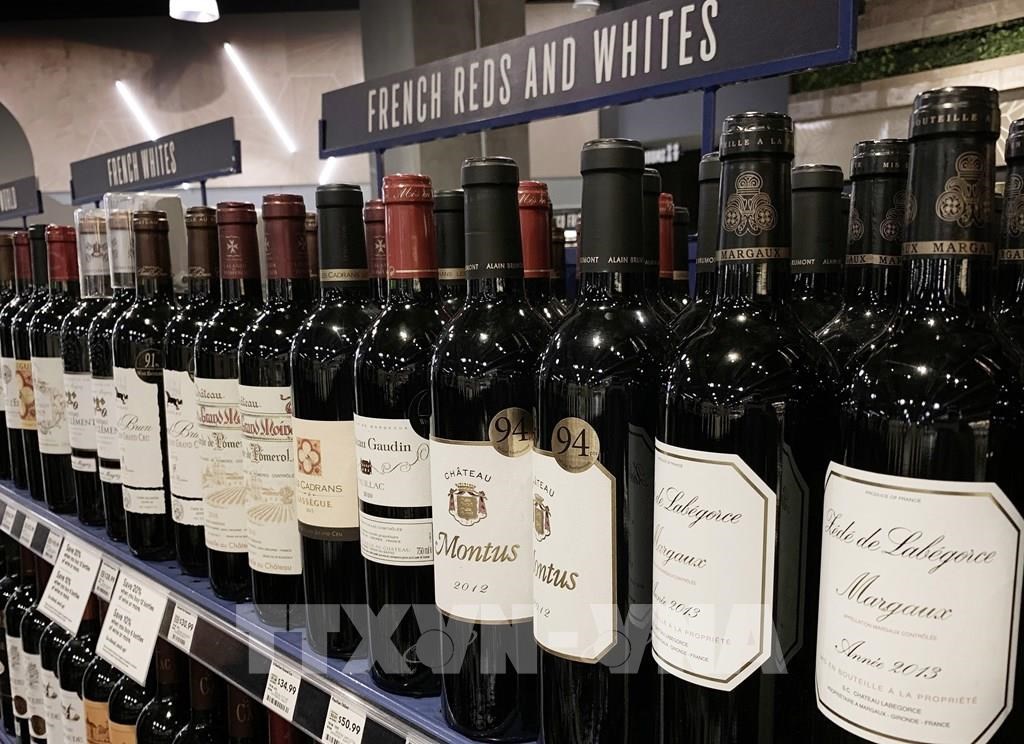Importing and distributing alcohol in Vietnam is a highly regulated activity, requiring businesses to comply with specific legal conditions related to restricted business sectors. This article provides a detailed guide on the legal requirements, the process for obtaining necessary permits, and key considerations to ensure lawful and efficient alcohol import operations.
Mục lục bài viết
1. Legal Requirements for Importing Alcohol
Under Decree 105/2017/ND-CP (amended and supplemented by Decree 17/2020/ND-CP), businesses importing alcohol into Vietnam must meet the following conditions:
- Alcohol Distribution License: Traders must obtain an Alcohol Distribution License issued by the Ministry of Industry and Trade to import and distribute alcohol. Pursuant to Clause 2, Article 20 of Decree No. 146/2025/NĐ-CP on the delegation of tasks and powers of the Ministry of Industry and Trade, the tasks and powers related to the issuance of liquor distribution licenses shall be delegated to the People’s Committees at the provincial level for implementation.
- Product Requirements:
- Imported alcohol must bear stamps and labels in accordance with Decree 43/2017/ND-CP on goods labeling.
- Compliance with food safety standards under the Food Safety Law 2010.
- Importation is permitted only through international border gates.
- Semi-finished alcohol may only be sold to businesses holding an Industrial Alcohol Production License.
Non-compliance with these conditions may result in violations and penalties under Decree 98/2020/ND-CP.
2. Legal Requirements for Businesses Importing Alcohol
2.1. Restricted Business Sector
Alcohol is classified as a restricted business sector under the Investment Law 2020. Businesses must adhere to the following regulations:
- Law on Prevention and Control of Harmful Effects of Alcohol and Beer (Law 44/2019/QH14): Compliance with requirements to mitigate the harmful effects of alcohol and beer.
- Safety and Environmental Standards: Adherence to regulations on fire prevention, food safety, and environmental protection.
- Appropriate Licensing: An Alcohol Distribution License is mandatory for lawful alcohol importation and trading.
2.2. Conditions for Obtaining an Alcohol Distribution License
According to Article 11 of Decree 105/2017/ND-CP, businesses must meet the following conditions to obtain an Alcohol Distribution License:
- Registration of appropriate business activities (e.g., wholesale or distribution of alcoholic beverages).
- Establishment of a distribution network covering at least two provinces/cities, including the location of the head office, with at least one alcohol wholesaler in each area.
- Possession of a principle contract or confirmation letter from a legitimate alcohol supplier (domestic or foreign).
3. Procedure for Obtaining an Alcohol Distribution License
3.1. Application Dossier
As stipulated in Article 21 of Decree 105/2017/ND-CP, the dossier for an Alcohol Distribution License includes:
- Application form for the Alcohol Distribution License (as per Form No. 01 issued with the Decree).
- A copy of the Business Registration Certificate or equivalent legal document.
- Documents proving the distribution network, including:
- Copies of principle contracts, confirmation letters, or commitments to participate in the alcohol distribution network, accompanied by copies of the Alcohol Wholesale License of participating traders.
- Alternatively, copies of the Certificate of Branch Registration or Business Location Registration for alcohol trading.
- Documents related to the alcohol supplier:
- Copies of principle contracts or introductory documents from legitimate alcohol suppliers, specifying the types of alcohol to be traded.
- If the supplier is a domestic trader, a copy of their Alcohol Production License or Alcohol Distribution License is required.
3.2. Licensing Procedure
The procedure for obtaining an Alcohol Distribution License includes the following steps:
- Submission of Dossier: The business submits the dossier directly, by post, or online (if applicable) to the People’s Committees at the provincial.
- Dossier Review:
- Within 15 working days from receiving a complete and valid dossier, People’s Committees at the provincial reviews and issues the license. If rejected, a written response stating the reasons must be provided.
- If the dossier is incomplete, the authority will issue a written request for supplementation within 3 working days.
Receipt of License: The business receives the license from People’s Committees at the provincial upon approval.

4. Procedures After Obtaining an Alcohol Distribution License
4.1. Registration with Customs Authorities for Import Clearance
To import alcohol, businesses must register with the General Department of Customs and prepare a dossier for customs clearance. According to Official Letter 6358/TCHQ-GSQL and Article 16 of Circular 38/2015/TT-BTC (amended by Circular 39/2018/TT-BTC), the specific steps are as follows:
4.1.1. Preparation of Import Dossier
The import dossier includes:
- Customs Declaration: As per Form No. 01, Annex II, issued with Circular 38/2015/TT-BTC. For paper declarations, submit two original copies as per Form HQ/2015/NK (Annex IV).
- Commercial Invoice: One copy. If goods are purchased from a domestic seller but delivered from abroad, an invoice issued by the domestic seller is acceptable.
- Bill of Lading or Equivalent Transport Document: One copy (except for goods imported through land border gates or transactions between non-tariff zones and domestic markets).
- Alcohol Distribution License: For alcohol with an alcohol content of 5.5% or higher, submit one copy of the license issued.
- Pre-Import Registration (for alcohol under 5.5%): For alcohol with an alcohol content below 5.5%, businesses must register with the Economic Division/Economic and Infrastructure Division of the People’s Committee at the district level where their head office is located, using Form No. 14, Section II, Annex of Decree 105/2017/ND-CP. This document is not required for customs submission.
- Food Safety Certificate: As per Decree 15/2018/ND-CP, submit one original or copy (if permitted by sectoral regulations).
- Proof of Import Eligibility: Submit one copy for the first import shipment, as required by investment laws.
- Value Declaration Form: As per Circular 39/2015/TT-BTC, submit electronically or two original copies for paper declarations.
- Certificate of Origin (C/O): If applicable, submit as per the Ministry of Finance’s Circular on determining the origin of goods.
4.1.2. Product Requirements
- Imported alcohol must be stamped and labeled in accordance with Decree 43/2017/ND-CP.
- Importation is permitted only through international border gates.
- Customs officers verify and cross-check information on the customs declaration, commercial invoice, food safety certificate, and Alcohol Distribution License.
4.1.3. Customs Clearance Process
- Dossier Submission: Businesses submit the dossier via the Electronic Customs Clearance System or directly at the Customs Sub-Department handling the procedure.
- Dossier Review: Customs verifies the dossier’s completeness and validity within 3 working days. If incomplete, businesses will be requested to provide additional documents.
- Clearance: Upon approval, goods are cleared, and businesses fulfill tax obligations to receive the shipment.
4.2. Inspection and Payment of Import Taxes
Imported alcohol is subject to special consumption tax as per Article 7 of the Special Consumption Tax Law 2008 (amended by the 2014 Amendment Law), with the following tax rates:
- Alcohol with 20% or higher alcohol content: 65% tax rate.
- Alcohol below 20% alcohol content: 35% tax rate.
Additionally, businesses must pay import duties and value-added tax (VAT) as prescribed. To ensure compliance:
- Accurate HS Code Declaration: The Harmonized System (HS) code must be correctly declared to apply the appropriate tax rate. Incorrect HS codes may lead to tax reassessments or administrative penalties.
- Timely Tax Payment: Taxes must be paid through the customs system or designated banks before clearance.
4.3. Compliance with Tax Reporting and Product Management Regulations
4.3.1. Product Management
- Stamping and Labeling: Imported alcohol must bear stamps issued by the Ministry of Finance and Vietnamese-language auxiliary labels detailing product information, as per Decree 43/2017/ND-CP.
- Record Keeping: Businesses must retain all relevant documents (invoices, contracts, specialized inspection certificates) for post-clearance audits.
4.3.2. Tax Reporting
- Special Consumption Tax Declaration: As per Decree 108/2015/ND-CP, businesses must submit monthly special consumption tax declarations by the 20th of the following month.
- Corporate Income Tax Declaration: Comply with the Corporate Income Tax Law 2008 and related guidelines, ensuring timely submissions (quarterly or annually, depending on business scale).
- Sales Invoices: Issue electronic invoices for each alcohol distribution transaction, as per Decree 123/2020/ND-CP.
5. Legal Risks and Considerations for Importing Alcohol
5.1. Risks of Contractual Disputes
Disputes with foreign suppliers are a common risk, arising from:
- Unclear Contract Terms: For instance, failure to specify responsibilities under Incoterms (transport, insurance, risk).
- Product Quality Issues: Lack of pre-delivery quality inspection provisions.
- Dispute Resolution: Undefined applicable law or dispute resolution authority (arbitration or court) can complicate dispute resolution.
Recommendations:
- Draft detailed contracts specifying responsibilities, product quality, and secure payment methods (e.g., Letter of Credit – L/C).
- Select a dispute resolution mechanism, such as international commercial arbitration.
5.2. Intellectual Property Issues
Imported alcohol may infringe intellectual property rights if:
- The brand is not registered for protection in Vietnam or has been preemptively registered by a third party.
- Importing counterfeit or imitation alcohol of well-known brands may lead to criminal liability.
Recommendations:
- Require suppliers to provide documentation proving trademark ownership.
- Verify trademark protection status with the National Office of Intellectual Property of Vietnam.
- Register contracts for trademark use or exclusive distribution rights.
5.3. Non-Compliance with Import and Distribution Regulations
Under Decree 98/2020/ND-CP, violations such as importing alcohol with 5.5% or higher alcohol content without an Alcohol Distribution License or failing to affix stamps/Vietnamese labels may result in:
- Administrative Penalties: Depending on the severity of the violation.
- License Revocation: For 1 to 3 months.
Recommendations:
- Prepare complete licensing dossiers before importation.
- Coordinate with customs and inspection authorities to ensure lawful clearance.
- Affix import stamps and Vietnamese auxiliary labels as required.
Importing alcohol into Vietnam requires strict compliance with legal regulations, from obtaining an Alcohol Distribution License to ensuring product quality and intellectual property rights. Thorough preparation of dossiers, contracts, and risk mitigation measures will enable businesses to operate efficiently and avoid legal issues.
Disclaimer:
This article is intended for informational purposes only and does not constitute legal advice from HTH & Partners. The content represents the views of HTH & Partners and is subject to change without prior notice.
The legal provisions referenced in this article were valid at the time of publication but may have been amended or repealed by the time of reading. We strongly recommend consulting a qualified legal professional before applying any information contained herein.



